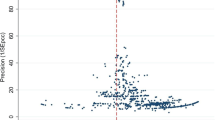Abstract
A thorough understanding of changes in productivity measures is important to economists and policymakers, because productivity growth is a major source of economic growth. This article explores the relationship between changes in total factor productivity (TFP) growth, defined using an index number approach, and changes in returns to scale, cost efficiency, and technology. Several decompositions are developed, using alternatively production and cost frontiers. The last decomposition developed also allows for multiple outputs.
Similar content being viewed by others
References
Bauer, P.W. 1988. TFP Growth, Change in Efficiency, and Technological Progress in the U.S. Airline Industry: 1970 to 1981. Federal Reserve Bank of Cleveland Working Paper 8804, June.
Denny, M., M. Fuss, and L. Waverman. 1986. The Measurement and Interpretation of Total Factor Productivity in Regulated Industries, with an Application to Canadian Telecommunications. In Productivity Measurement in Regulated Industries, T.G. Cowing and R.E. Stevenson, eds., New York:Academic Press,
Diewert, W.E. 1976. Exact and Superlative Index Numbers. Journal of Econometrics, 4 (May):115–145.
Diewert, W.E. 1981. The Theory of Total Factor Productivity Measurement in Regulated Industries. In Productivity Measurement in Regulated Industries, T.G. Cowing and R.E. Stevenson, eds., New York:Academic Press.
Färe, R., S. Grosskopf, and C.A. Knox Lovell. 1985. The Measurement of Efficiency of Production, Boston: Kluwer-Nijhoff Publishing Co.
Farrell, M.J. 1957. The Measurement of Productive Efficiency. Journal of the Royal Statistical Society, General Series A, 120, part 3.
Gollops, F.M., and M.J. Roberts. 1981. The Sources of Economic Growth in the U.S. Electric Power Industry. In Productivity Measurement in Regulated Industries, T.G. Cowing and R.E. Stevenson eds., New York:Academic Press.
Hulten, C.R. 1973. Divisia Index Numbers. Econometrica, 41 (Nov):1017–1026.
Jorgenson, D.W., and Z. Griliches. 1967. The Explanation of Productivity Change. Review of Economic Studies, 34 (July):249–283.
Kopp, Raymond J., and W.E. Diewert. 1982. The Decomposition of Frontier Cost Function Deviations into Measures of Technical and Allocative Efficiency. Journal of Econometrics, 19, 2/3 (Aug):319–31.
Nishimizu, M., and J.M. Page. 1982. Total Factor Productivity Growth, Technological Progress and Technical Efficiency Change: Dimensions of Productivity Change in Yugoslavia, 1965–78. The Economic Journal, 92 (Dec.):920–936.
Ohta, M. 1974. A Note on the Duality Between Production and Cost Functions: Rates of Return to Scale and Rates of Technical Progress. Economic Studies Quarterly, 25 (Dec):63–65.
Richter, M.K. 1966. Invariance Axioms and Economic Indexes. Econometrica, vol. 34 (Oct.):739–755.
Schmidt, P. 1984. An Error Structure for Systems of Translog Cost and Share Equations. Econometrics Workshop Paper 8309, Department of Economics, Michigan State University.
Sickles, R.C. 1985. A Nonlinear Multivariate Error Components Analysis of Technology and Specific Factor Productivity Growth with an Application to the U.S. Airlines. Journal of Econometrics, 27, 1 (Jan.):61–78.
Stevenson, R.E. 1980. Likelihood Functions for Generalized Stochastic Frontier Estimation. Journal of Econometrics, 13, 1 (May):57–66.
Zieschang, Kimberly D. 1983. A Note on the Decomposition of Cost Efficiency into Technical and Allocative Components. Journal of Econometrics, 23, 3 (Dec.):401–5.
Author information
Authors and Affiliations
Additional information
The refereeing process of this paper was handled through W.H. Greene.
Rights and permissions
About this article
Cite this article
Bauer, P.W. Decomposing TFP growth in the presence of cost inefficiency, nonconstant returns to scale, and technological progress. J Prod Anal 1, 287–299 (1990). https://doi.org/10.1007/BF00160047
Issue Date:
DOI: https://doi.org/10.1007/BF00160047




